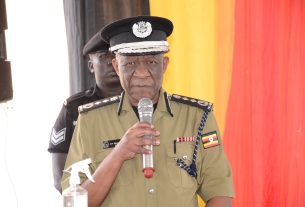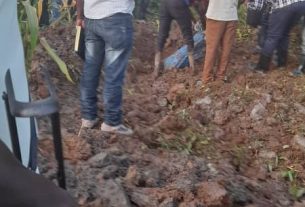They have always been known as man’s best friend. But they are also his best security partner. And in these days of increasing drug and terror related crimes, dogs have become an indispensible component of serious national security services all over the world. Uganda is no exception to this phenomenon, and serious steps have been taken by the police force to revive and improve the police dog services.
They have always been known as man’s best friend. But they are also his best security partner. And in these days of increasing drug and terror related crimes, dogs have become an indispensible component of serious national security services all over the world. Uganda is no exception to this phenomenon, and serious steps have been taken by the police force to revive and improve the police dog services.
The expansion of the previously neglected Uganda Police Canine Unit has been phenomenal in the last three years . That trained police dogs are now deployed to over fifty stations around the country, up from only 17 stations in 2010 is impressive enough. But the way the expansion is being conducted simply calls for nothing short of celebration – for it is being powered by communities in partnership with the police.
When he took over at the Nsambya based unit in 2010, Dr Martin Mugume found a concentration of more police dogs in Kampala – more than half – than the rest of the country combined. This meant that it would sometimes take two days for a dog to be taken to a scene of crime since it had to be transported long distances. The whole of the Western region for example had only two dogs. By the time a dog arrived from say Kabale to Masindi, the crime scene would have been compromised by human tampering, rain and other factors including simply the passage of time, making the dog’s intervention less effective and at times ineffective and therefore a waste of resources. Mugume’s first new station to deploy a dog to was the far-flung Moroto in 2010, and there has since been no looking back for this fast growing specialized unit.
When he first appealed to communities to provide standard kernels that cost Sh4 million as their contribution, the response was simply overwhelming. And this understandably so. For a person whose relative or neighbour was murdered but investigations could not be conducted swiftly due to absence of a police dog would not hesitate to offer what they can to get a trained dog in their locality. Wherever police indicates ability to deliver a trained dog, the community usually raises the required inputs for a standard kernel in less than a day. Communities that have police dogs have taken ownership and pride in their precious acquisitions. However police strictly keeps the feeding function itself owing to the need for maintaining the dogs in strict health and safety.
Rolling out to more stations is under way and by 2017, the force will have the capacity to immediately dispatch a police dog to every village in Uganda where a crime is committed and canine intervention is required.
Updating of the Canine Unit which started in 2010 found some demoralized dog handlers who did not have many more clues about the future than the dogs they were handling. Some handlers who could not be easily retrained were transferred and the roll out started. In places were dogs have been deployed, noticeable improvement in fighting crime has been noted. There have been instances of perpetrators confessing on seeing a dog being brought to start the hunt, thereby saving everybody’s time.
2- Training of Trainers
When the UPF leadership decided to revamp the dog services, they were not ready to settle for just a good service. They wanted only the very best. So they opted for Israel as the best place to send their officers for training in training security dogs.
Last year, six officers were thus initially dispatched to Israel where they spent a considerable period undergoing intensive training in training dogs in advanced identification of dangerous substances including non traditional explosive materials and narcotics, and search and rescue missions. Working with Israeli instructors, the Ugandans acquired the latest skills in the training of dogs that they started using immediately on returning home, and training more of their colleagues. A comprehensive training programme for trainers of dog handlers and training of dogs themselves has now been set up.
3- High Cost But it Has to be Borne
Good breeds of security dogs do not come cheap. And again, not ready to settle for second-best, UPF headed to South Africa where the art of dog breeding has been perfected for over two centuries. With a single animal of the cheapest sniffer breed going for the equivalent of twenty million shillings, a reasonable number of dogs (that can not be stated for obvious reasons) was procured to start with, and the procurement has been continuing. More expensive breeds to be trained for more difficult tasks have also been acquired.
4- Uganda starts breeding on its own
With an eye to the future, scientists at the Canine Unit have already started building capacity for Uganda to do its own breeding, with assistance from South African experts in the beginning. The country’s requirement for security dogs cannot be fully met as the population grows, existing dogs age and more organisations and private homes start appreciating the need for good dogs. Moreover, police also has to keep growing its dog population until such a time as when there is a dog at every police post.
5- Feeding
To maintain the quality (and obviously safety) of the dogs, the Canine unit has instituted a standardized feeding kit for the police dogs all over the country. Under the old system money would be sent to different stations to procure food for the dogs, but this had its shortcomings and has had to be phased out. It had weaknesses such as proper food not being readily available in some locations, and was open to loopholes like the possibility of an unscrupulous handler misusing the money to the detriment of the dog. When a working dog is not properly fed, its performance is adversely affected and so is its health. The unit has settled for centrally procuring specific formula feeds that are completely unpalatable to humans and have no ready market value in Uganda.
6- Ready for the frontline in fighting Terrorism
With the increased threat of terrorism, UPF’s Canine Unit has taken on a special role. The terrorists now have sophisticated bomb materials that might not be detected by the usual x-ray based scanners and weapon detectors. Some bomb materials are in liquid or viscous form and could be disguised as lotions, toothpaste or human medicine. So Uganda’s Canine Unit has acquired and continues to expand the team of sniffer dogs that can detect the latest non-conventional bomb materials.
7- Increasing role in fighting drugs
With Uganda unfortunately fast becoming a major transit centre for narcotics (courtesy of the weak laws that can let offenders off with a light fine) the Canine Unit has trained sniffer dogs that can detect narcotics that are concealed in containers and packages of strong smelling cargo. The dogs have to undergo training in detecting newer versions of narcotics. A bigger number of dogs is required so that more transit points get covered.
8- Building capacity of other institutions and homes
The philosophy of the Uganda Police Canine Unit is to EMPOWER others by building capacity of other institutions and private establishments to have their security dogs so as to reduce the strain on the police force which in turn can concentrate on training and qualitative development.
To this end, the UPF Canine Unit is already helping to build dog management and handling capacity for the national military and the country’s prisons services. The unit is also developing a programme to build capacity for Uganda Wildlife Authority to enable them combat the increasing menace of poaching. In particular, the elephant population is highly endangered due to increasing smuggling of ivory concealed in different containers and destined mainly to the far East where a lucrative market for it is booming. The unit is also encouraging private security firms to set up dog units which it can offer expertise to develop.
More significantly, UPF is already offering private individuals to have their young dogs trained for protecting their homes. Individuals are already being allowed to take their puppies for training at the unit and they are taught how to feed them and handle them professionally. With more homes having trained guard dogs for their security, the police canine unit can concentrate on police dog work of crime investigation, training, breeding and delivering critical functions like fighting terrorism and narcotics.
9- New training for search and recsue
The Canine Unit has been working quietly on expanding its frontiers, and will soon be passing out the region’s first dogs to be trained in search and rescue mission for finding victims buried under rubble of collapsed buildings or in situations like the Bududa landslides. Demonstrations performed by the unit show the special capabilities of a dog in pinpointing the location of a human being buried under the ground. The dogs are also able to pinpoint the location of a dead body buried under soil or rubble. UPF’s canine unit intends to help sister forces in neighbouring countries train search and rescue dogs for them.
Photos: Series of rescue drill photos; series of tracking a murderer (real); UPF personnel undergoing training in Israel; Uganda Prisons dog handlers being trained by UPF canine unit.




